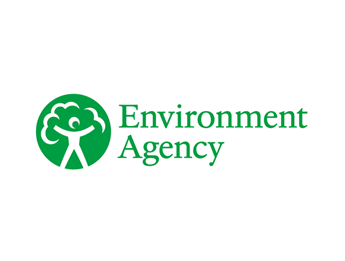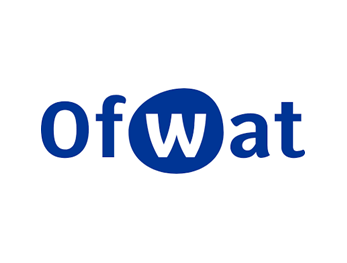The natural environment is a very important issue for us, our customers and stakeholders. Therefore, seeing negative aspects of the sector’s wastewater treatment performance in the spotlight has been enormously concerning.
Our vision is to be the leader within our sector for environmental performance for our customers and communities. We have ambitious plans for our coasts and rivers, with nine key pledges designed to improve the water environment and demonstrate our commitment to the highest possible environmental performance.
These can be found in ‘A vision for coasts and rivers’, alongside helpful information for customers and stakeholders on the current situation, investment plans and opportunities for the wider public to make a difference for our coasts and rivers. This was supported by nine pledges that will deliver water quality benefits and improvements for the environment of our rivers and coasts. We are pleased that Ofwat and other stakeholders have welcomed these as industry leading ambitions.

A vision for our coasts and rivers
The water environment is at the heart of everything we say and everything we do as a business.
Find out more
Our commitment to the environment is demonstrated in our performance, where we have achieved several significant successes towards this, including:
- We achieved a three-star “good company” rating in the Environment Agency’s 2023 Environmental Performance Assessment, maintaining that standard from 2022.
- The Environmental Performance Assessment results also showed that we had had no serious pollutions in 2023, and indeed since 2021. This assessment highlighted us as “one of the better performing companies on this metric”.
- Our work has also contributed to 32 of the North East’s 34 designated Bathing Waters achieving the top ratings of ‘excellent’ or ‘good’ in Defra’s most recent classifications (in 2021), up from 26 in 2013.
- We also have an ambitious goal to achieve net-zero (Scope 1, 2 and 3 emissions) by 2050. During the past 15 years we have reduced our Scope 1 and 2 emissions by over 90%.
- This has all been achieved while offering our customers the lowest wastewater bill in England.
However, we are not complacent, and we know we must continue to do more to support the natural environment.
Environmental compliance at Wastewater Treatment Works
Background
In November, we, along with all other wastewater companies, were contacted by the Environment Agency (EA) and Ofwat about measures to ensure permitted ‘Flow to Full Treatment’ requirements are being achieved at our Wastewater Treatment Works. This was followed by a further request from Ofwat in March 2022, more information on which is outlined below.
Flow to Full Treatment (or FFT) is a measure of the maximum flow a wastewater treatment works is designed to treat.
When wastewater treatment works are built, they are designed to meet a ‘flow’, the volume of water going through the works. The Environment Agency, our regulator, requires water companies to design wastewater treatment works ‘to treat peak dry weather flow and additional flows from light rainfall’.
This involves calculating the dry weather flow (DWF), which helps us understand the minimum volume the plant will need to treat during a period without rainfall. The DWF is then used as a base to help calculate the FFT level that meets the regulatory requirements. This means every treatment works has a unique FFT value. In some cases, this value is included in a permit from the Environment Agency with which a water company must comply. Across our 410 wastewater treatment works, there are 189 which are permitted with an FFT requirement.
While the precise circumstances can differ at individual treatment works, a system is normally designed to treat a flow volume of around three times the maximum dry weather flow (DWF). If this flow is exceeded, for example, by a storm event, snowmelt or flooding draining, then flows in excess of the FFT level are diverted.
This can either be:
- to large tanks where the flow is stored until the storm subsides. When the flow into the works reduces after the storm event has ceased and treatment capacity becomes available, the contents of the storm tanks are returned to the inlet to the works to pass through the treatment process.
- Or, to an overflow on the works, which is usually set to spill over directly to a watercourse when the flow exceeds around six times DWF.
This means that, even if sites were not compliant with FFT, this is unlikely to create any harmful spills to the environment - in most cases, the flows would be diverted to storm tanks and then passed back through the treatment process.
When treatment works were first built, they were designed and engineered to a specific capacity to achieve FFT levels. At the same time, the staff operating these sites will monitor their performance and take corrective action to maintain them, ensuring that they continue to operate effectively. Finally, compliance is also checked externally by our regulators through periodic site visits and assessments.
As part of the industry’s Water Industry National Environment Programme (WINEP) work between 2020-25, an extensive investment programme is underway to improve this monitoring and install MCERTS (the EA’s Monitoring Certification Scheme) approved equipment.
Monitors currently installed can either be at the ‘front-end’, or ‘back-end’ of the treatment works. Front-end monitors' will typically compare information on flows directly to FFT permit requirements. They monitor the flows coming into the ‘front’ of a treatment works at a set time before elements are removed or filtered out in the treatment process. ‘Back-end’ monitors instead look at the volumes leaving the site post-treatment.
Every site has its specific process, equipment and procedures and will treat a varying volume on different days; all of this leads to a length of time for water to pass through the treatment process, and it is very difficult to accurately extrapolate from a back-end monitor what flows were coming into the works at a set point in time.
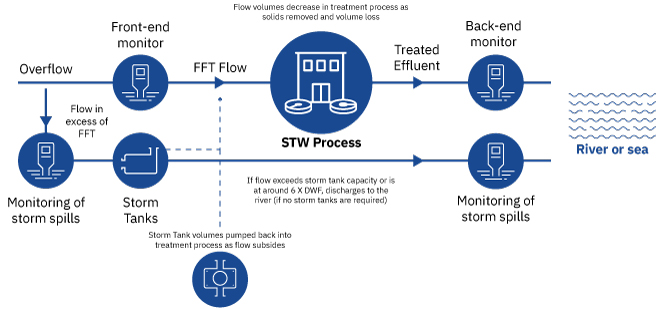
We are investing £45.56 million in flow measurement schemes up until 2025. This will give us much greater coverage of MCERTS front-end monitoring. We have completed investigations on whether we can install the same monitoring to additional sites for completion between 2025 and 2030.
Our regulators are seeking specific information as part of a cross-industry investigation to check our compliance with a specific aspect of our environmental permit conditions relating to discharges and our related statutory and licence duties. We provided extensive information to the EA and Ofwat in November and December last year.
The water industry, EA and Ofwat have worked closely together to tackle the challenges presented by discharges by developing the Water Industry Natural Environment Programme (WINEP). Investment is allocated between 2020-25 as part of the current business plan period. We are installing new monitoring equipment as agreed with Ofwat and the EA. We have been following a clear plan to address any issues that arise and continuously improve on assuring our environmental performance.
In early March 2022, Ofwat issued a formal notice (a Section 203 notice) requiring us to provide further information with a deadline for submission in early April. This notice is a formal investigatory step and indicates that Ofwat will carefully consider the information in light of our legal obligations. It does not necessarily imply that any enforcement action will follow, but it is a more formal process.
We recognise the issue’s importance to our stakeholders and customers and the gravity of the investigation. We fully complied with the requirements to provide information by submitting our response in April, taking the opportunity to demonstrate to Ofwat that we take our responsibilities very seriously.
We have also subsequently provided an update to Ofwat on our progress which remains on track.
In July, we met with Ofwat to discuss our responses to their investigation. As a result of this meeting Ofwat sent us two sets of follow-up questions and we have fully responded to these. We are pleased that Ofwat has “recognised and welcomed our transparency” in these exchanges of information and in our approach to the investigation in general.
In July we received a further information request from Ofwat in relation to our sewerage system in the Whitburn area. Again we responded fully: describing in more detail how our spill reduction scheme in the area had been designed; providing evidence that recent spills in the area had been due to rainfall; and providing further evidence that reducing spills in the Whitburn area had had no detrimental effect on spill numbers further downstream in our sewerage network. To give further transparency we supplemented this response by arranging for the Ofwat Investigation team to undertake a site visit.
We understand that Ofwat continues to move towards its reporting/conclusion stage of the investigation for NWL, however in the meantime we will endeavour to respond fully to any further information requests should any arise.
March 2023 - June 2023
We continue to respond fully to further information requests from Ofwat received in May and June. These requests related to:
- Obtaining updated/appropriate environmental permits following detailed checks undertaken by NWL which had identified c58 points across some 30,000km of our sewer network where a discharge of wastewater could take place during rainfall but which didn’t have the appropriate permit documentation. In all cases the correct permits have now been requested from the EA.
- Further information in relation to independent checks of FFT compliance undertaken for us by Wood Group at all relevant sites. This work has now been completed and has identified no further potentially non-compliant sites.
- An update on work being undertaken by NWL to investigate a number of ‘foul only’ sewage pumping stations which should not receive storm water/rainfall but nevertheless appear to show higher flows during rainfall. We are checking these carefully to ensure there is no risk of an unpermitted discharge.
- More information on the ongoing checks and adjustments we are making at our wastewater sites on an ongoing basis to ensure that compliant operations are maintained over time.
- Further information in relation to a spill reduction scheme in the Whitburn area which was completed in 2017/18.
We understand that Ofwat continue to move towards its reporting/conclusion stage of the investigation for NWL, however in the meantime we will endeavour to respond fully and transparently to any further information requests.
December 2022 – March 2023
In early January we responded fully to a further data request from Ofwat (received December 2022). This related to wider aspects of environmental compliance at Sewage Treatment Works, looking much broader than FFT compliance.
This submission to Ofwat was followed by a further meeting on 24 January. After the meeting Ofwat set out some follow-on questions, to which we responded fully on 10 February.
We understand from the meeting that Ofwat is now collating its conclusions and corresponding report on this investigation.
In the meantime, we continue to monitor and scrutinise our compliance very carefully as part of our normal practice.
September 2022 – December 2022
We met with Ofwat over the summer and they noted in their discussions with us that they ‘welcomed our transparency’ on this issue and that they were ‘broadly satisfied’ with our action plans and response.
Having fully responded to the two further information requests from Ofwat over the summer, by September there were no further actions required of us by the regulator in relation to the investigation and we had completed all the near-term actions that we set out in our action plans in April.
Given this position, we wrote to Ofwat in September to ask them to articulate their outstanding compliance concerns or, if they were satisfied with our position, what the process was to conclude their investigation. Ofwat advised that they could not conclude the investigation highlighting that they needed to thoroughly assess all of the information they have had to date from companies as well as other sources of intelligence but did not set out any further concerns or timescales.
At the end of September we received a letter, which was issued to all companies, in relation to compliance with requirements for pollution reporting. We responded in full on 19th October setting out a robust approach to reporting of potential pollution incidents. A copy of this letter can be found here.
The next communication we received from Ofwat was in December, when we received a further data request relating to wider aspects of environmental compliance at Sewage Treatment Works - this request was much broader than FFT compliance. We are currently collating the required data in order to respond in January 2023.
Meanwhile we continue to monitor and scrutinise our compliance very carefully as part of our normal practice.
A summary of actions completed and in progress is provided below:
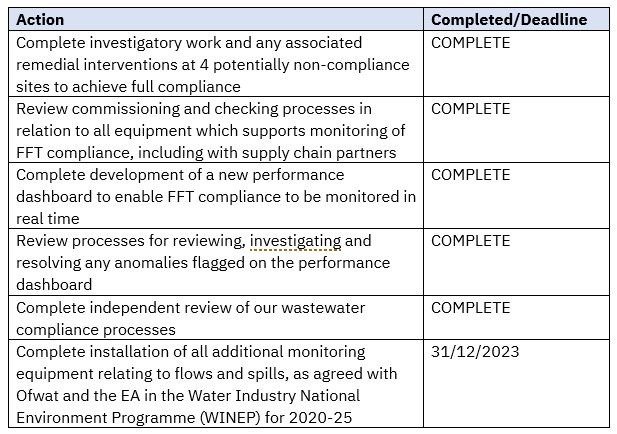
July 2022 – September 2022
Following completion of the work, we have engaged with consultants to independently assure the compliance of these works. This has required periods of sustained wet weather to confirm that each works is treating the required volumes before any spills occur. This has now been completed and all four of the sites are compliant.
While these works have been completed and compliance verified on the four named sites, we will continue to scrutinise compliance with our environmental permits at all sites. Likewise, where some non-material areas for continuous improvement have been identified, we will be taking these forward internally. We will continue to update customers and stakeholders appropriately.
We are very disappointed to have identified the risk of potential noncompliance with the FFT permit requirements at these sites. However, we can find no evidence of any material impact on the environment. The table below shows how the impacted supply areas have had no serious pollution events since 2013 and where appropriate bathing waters have been assessed at least as Good, with all now Excellent.
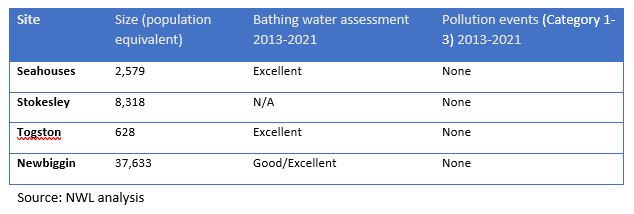
We have looked closely at our performance, monitoring systems, and standard operating procedures as part of this process. As a company committed to constantly improving our environmental performance, we will continue to update and improve these procedures.
We have found several areas where operational improvement may be possible for sites already compliant with their permit, further improving performance beyond the requirements for environmental benefit, and are implementing this as appropriate. This has included:
- Improvements to reporting internally of spills, including a senior level monthly review.
- A new trigger process for immediate investigations into any site that shows a risk of non-compliance.
- Increased data transparency planned for customers and stakeholders in line with our pledges.
- Regular updates on this specific topic and increased opportunity for scrutiny from our Water Forums, a Customer Challenge Group.
- Further investment in new monitors across sites beyond our committed projects in our Business Plan.
We have also completed a full review of our wastewater compliance assurance processes conducted by an independent company. This assessed the full breadth of our wastewater compliance obligations across nine key areas. Each area was assessed against four criteria:
PLAN: Do we fully understand each obligation and how it related to our assets and operations
DO: Do we have the right data to understand our current level of compliance
CHECK: Is the data made available to the right people in an understandable format
ACT: Is there a clear process for taking preventive action where the data warrants it, in order to maintain compliance
The review hence made an assessment of 35 aspects of our approach to wastewater compliance (9x4 less 1 n/a) and concluded with a “green – No gaps identified” assessment in 22 areas, a “yellow – no material gaps but suggestions for further improvements made” in 12 areas, and 1 area assessed as “amber” where work is already in progress.
As the majority of findings from this review were not material, we will progress these as business as usual.
We have now completed all of the short-term actions in our action plan, as agreed with Ofwat, as well as having resolved the issues identified at the four sites, as outlined above.
There are some longer-term actions, to install additional monitoring at our wastewater treatment sites. The schedule for this work has been agreed with the Environment Agency and we are on track to deliver this within those timescales.
January 2022-June 2022
Our investigations have shown that overall, across the 189 locations where we have these permits, we identified circumstances where we may not have always achieved the required FFT levels at four smaller sites. We have reacted swiftly to address this, investing in new equipment and improved processes to remove the risk that these four sites were not fully compliant. The sites affected and the actions taken are outlined below:
- Seahouses Wastewater Treatment Works, which serves 2,579 customers, where we installed extra pumps in late March, which brought the works into full compliance.
- Stokesley Wastewater Treatment Works, which serves 8,318 customers, where it appears grit and silt have penetrated part of our system, reducing the available flow. We have corrected this issue and brought this into full compliance by May 2022.
- Togston Wastewater Treatment Works, which serves 628 customers, where we are assessing the effectiveness of recently installed new pumps along with checking for any further hydraulic restrictions on site. This was completed at the beginning of June 2022.
- Newbiggin Wastewater Treatment Works, which serves 37,633 customers, has a unique system for pumped inlet flows. Analysis indicates that it is inconsistent in being fully compliant. We optimised site settings and controls, which enabled us to move the site to consistent and full compliance and supplemented this with a hydraulic study of the site, all completed with the site in compliance in June 2022.
On 6 August 2024, Ofwat proposed a £17m fine for Northumbrian Water Limited, alongside fines for Thames Water and Yorkshire Water Limited.
We have been working through this ruling and have today responded to Ofwat, Tuesday 10 September 2024.
We will continue to keep customers informed on this page.
Keeping you informed
We are engaging directly with stakeholders at our sites where we plan investment to ensure compliance with a permit at a Wastewater Treatment Works. We will update customers and stakeholders as we complete further investments and investigations to confirm all sites are in compliance with environmental permits,
We have also published a new report and plan, ‘Our vision for coasts and rivers’, which brings together all of our work to date, plans up to 2025, and a longer-term, more comprehensive plan for meeting customer and stakeholder expectations on the broader issues of Storm Overflows, water quality in our rivers and reducing pollution.
We have maintained regular conversations with our Water Forums as representatives of our customers. As these investigations continue, we will regularly update these pages for our customers and stakeholders.
In line with our continued commitment to leading environmental performance, we will work with our regulators, customers, and stakeholders to swiftly resolve any issues arising from this process.
If you would like to contact us to find out more about these issues or have any questions, please email externalcommunications@nwl.co.uk



